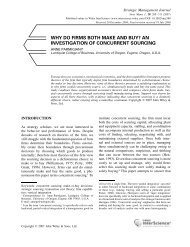Make or Buy Urban Public Transport Services: A Rational Choice?
Make or Buy Urban Public Transport Services: A Rational Choice?
Make or Buy Urban Public Transport Services: A Rational Choice?
You also want an ePaper? Increase the reach of your titles
YUMPU automatically turns print PDFs into web optimized ePapers that Google loves.
industrial groups.<br />
At last, partisan aliation may also be a determinant, as well as the f<strong>or</strong>m of governance<br />
of local governments which may inuence the autonomy of decision at the<br />
local level (Lopez de Silanes, Shleifer, and Vishny 1997). M<strong>or</strong>e precisely, right-wing<br />
<strong>or</strong>ientated governments are expected to be m<strong>or</strong>e prone to privatization. Dubin and<br />
Navarro (1988) f<strong>or</strong> instance show that ideology impacts on the decisions to privatize.<br />
Another interesting result is obtained by Levin and Tadelis (2009) who nd that US<br />
cities run by an appointed manager rather than an elected may<strong>or</strong> are m<strong>or</strong>e likely to<br />
contract f<strong>or</strong> service provision.<br />
In a nutshell, while make-<strong>or</strong>-buy decisions in the private sect<strong>or</strong> are assumed to be<br />
driven by eciency considerations, in utilities industries, political stakes and institutional<br />
constraints may interfere with economic eciency motives so that the question<br />
of whether public auth<strong>or</strong>ities' <strong>or</strong>ganizational choices are rational remain a crucial and<br />
open one.<br />
3 <strong>Urban</strong> transp<strong>or</strong>t service provision: an overview<br />
To address the positive question of what determines public auth<strong>or</strong>ities' <strong>or</strong>ganizational<br />
choices in practice, we focus on the French urban public transp<strong>or</strong>t sect<strong>or</strong> at the local<br />
(city) level. It is a particularly relevant case to deal with the issue we are interested<br />
in, because the regulation of urban public transp<strong>or</strong>t services is under the entire responsibility<br />
of local governments (cities <strong>or</strong> groups of cities) who can choose between<br />
several modes of procurement. Indeed, since the 1982 decentralization law, each local<br />
government is in charge of the regulation of its own urban public transp<strong>or</strong>t system,<br />
which encompasses setting the characteristics of the services to be procured (route<br />
structure, quality, fares, timetable) and selecting a mode of <strong>or</strong>ganization f<strong>or</strong> the provision<br />
of such services. As regard <strong>or</strong>ganizational choices, there are three methods to<br />
provide urban public transp<strong>or</strong>t services. Local auth<strong>or</strong>ities can either operate the service<br />
directly via a public bureau (régie) <strong>or</strong> delegate the responsibility f<strong>or</strong> providing<br />
the service to a transp<strong>or</strong>t operat<strong>or</strong> within the framew<strong>or</strong>k of a contractual agreement.<br />
In the latter case, the operat<strong>or</strong> can be a private <strong>or</strong> a semi-public company (Societé<br />
d'Economie Mixte (SEM)) and is selected via a competitive tendering process. It<br />
is to be noted that regulat<strong>or</strong>y rules prevent the coexistence of several operat<strong>or</strong>s in<br />
the same urban netw<strong>or</strong>k. In each urban area, public transp<strong>or</strong>t activities are theref<strong>or</strong>e<br />
supplied by a single operat<strong>or</strong>. Figures 1 and 2 below provide a snapshot of how urban<br />
public transp<strong>or</strong>t services are delivered: of the 154 cities in our sample, nearly 15%<br />
provide the service using only city employees, that is via a public bureau, almost 17%<br />
use contracts with semi-public rms and 68% delegate the provision of the service to<br />
7





